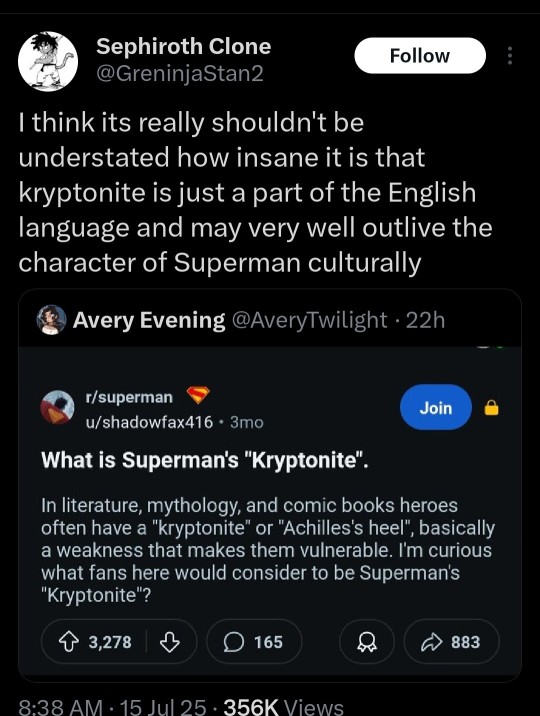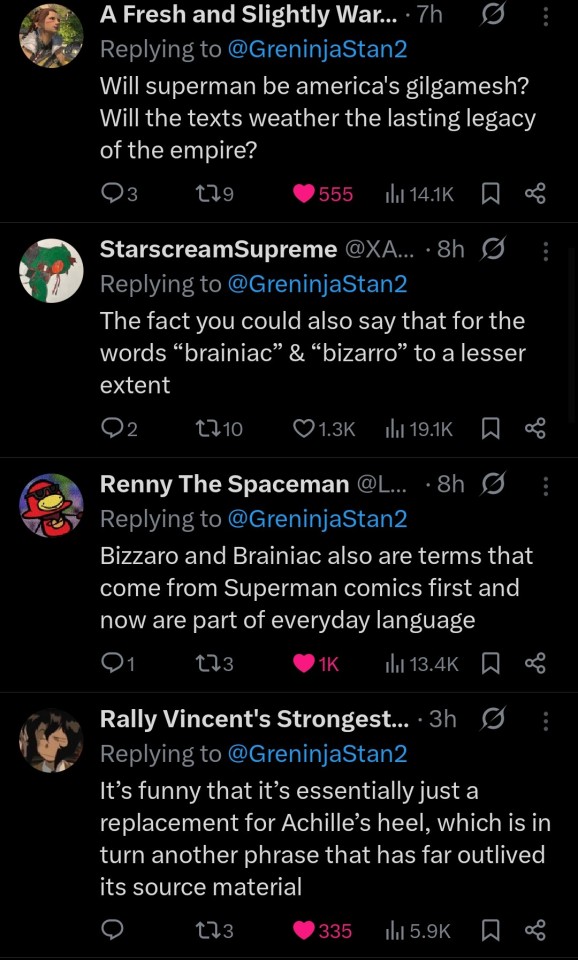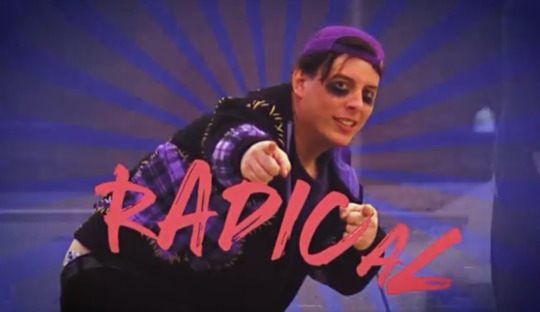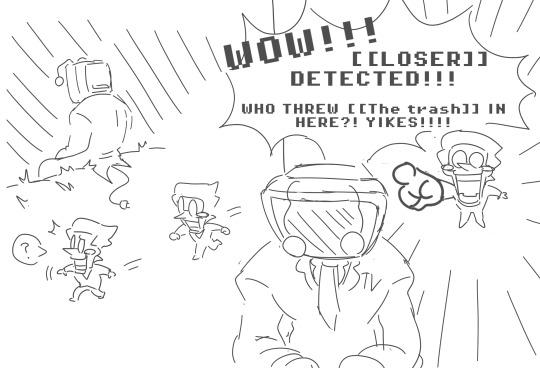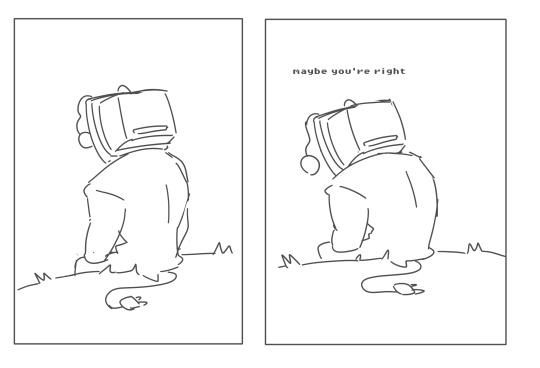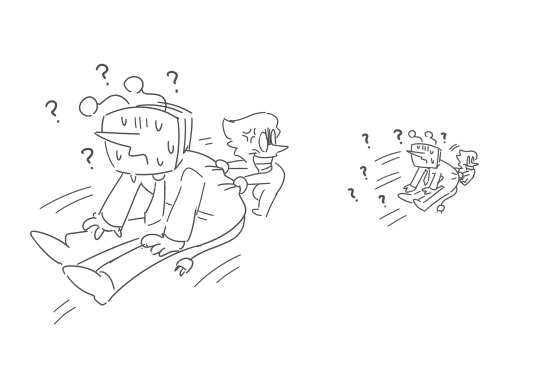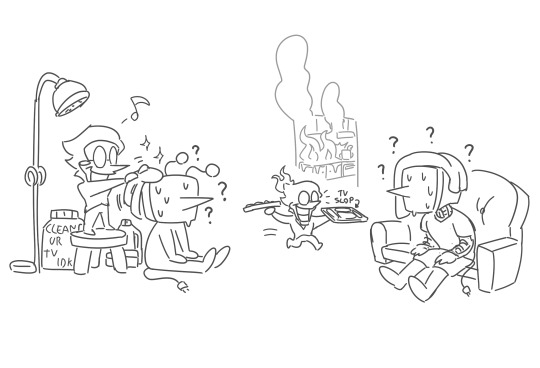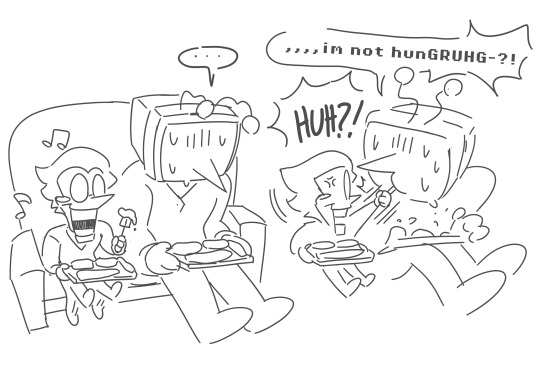Call me Leon. he/they/it pronouns. Member of many fandoms. This is where I keep all my ✨autism✨
Don't wanna be here? Send us removal request.
Text
wait kids need ai to make their favorite characters talk??? they can't just do that in their heads normal style?? what happened to making your favorite characters kiss by making little videos in your head and projecting it into your psyche cinema style before bedtime
32K notes
·
View notes
Text
donald trump will die on july 20th 2025 at 1pm pacific standard time
146K notes
·
View notes
Text
They chose this kind of scene specifically to show Till reflecting and realizing that a part of Ivan was also so desperate because he was scared, even he didn't want to be alone, (Ivan's narrative has spent so much time defining him in ways that make him seem inhuman and detached from these kinds of things until he can't deny that Till was everything he wanted, but to Till, Ivan was always like this, human and pitiful while thinking back on it)
It's just so...matured? compassionate? kind? In the past, Till would've regarded this scene with annoyance and scorn from the high heavens, this typical scene of Ivan giving Till's pencil back as if he didn't steal it, like a bastard. But the strained and bruised edges of his smile just add pitifulness and depth to it, right when Till is just now coming to understand that Ivan was trying, they were both trying to survive and retain some warmth in ways the other didn't understand



i need to run over ivan with my truck
556 notes
·
View notes
Text

I'm like experiencing yuri pssychosis
3K notes
·
View notes
Text
yes suguru's plans to exterminate a vast majority of humanity is undeniably evil, but to say that he is murderous from the very start, cruel for the sake of being so, or lacks compassion or any emotional nuance is a gross disservice to his character's writing.
suguru is a case study of a romantic idealist and self-sacrificial saviour whose absurdly rigid, quixotic ideals are shattered brutally by reality intervening. the intense hatred he has for humanity is born out of, is an inverse of, the intense love he once possessesed for it. this is also why even though satoru is portrayed as brash and selfish and arrogant in the hidden inventory arc, it is suguru that turns "villainous."
suguru places his faith in the goodness of humanity, believes the duty of shamans is to protect the weak, their existence solely hinged upon saving the lives of non-sorcerers, and for that he is disappointed so tremendously, betrayed to an extent that makes it impossible for him to recover his ideals and past self.
ultimately there are also more than one reasons why satoru doesn't become "evil" : 1) "protecting humanity" was never his cause to begin with. he hardly cared about preserving human life, as is evident in his intentions to kill the cultists who cheered on riko's death, and 2) he had someone shielding his inner self : suguru. for it is suguru that tells him the duty of shamans is to protect non-shamans and the weak, suguru who asks him to sympathise with riko, suguru who persuades him to not kill meaninglessly.
satoru is indeed attached to riko, as well. he is the one who decides not to hand riko over to tengen if she wishes to return home, and tries to enliven her last days as a lucid person. it would thus not surpass one’s expectations if satoru turned to villainy post riko's demise, since he never even liked non-shamans to begin with. and yet, he doesn't. suguru protects his heart, which is a part of why he is able to steadily process his grief and anguish over riko's death.
suguru doesn't have anyone to do that for him, he is strong in his own right but not the "strongest", nobody notices how deep of an abyss his soul has sunken in, and he succumbs to the lethal loneliness, falters in this marathon of sorcery.
suguru is brimming with love and compassion: it is what drives his heroism in youth and villainy as a cult leader. he is able to protect gojo's heart but not his own. he fluctuates between two polar extremes : utter distaste of humanity Vs. a duty to protect it despite its horrors. three things serve as final nails to the metaphorical coffin : yuki's words, haibara's death, miminana's abuse. he describes imbibing curses for curse manipulation is "like eating a rag used to clean vomit". how macabre, how grotesque, how enlightening - who is he doing all this for? the humans who killed riko? it was these humans haibara died serving, these same humans violently mistreated miminana.
toji and sonoda encapsulate evil very blatantly, and aren't enough to shake suguru's belief in humanity. but the turning point is the non-shaman cultists rejoicing : suguru is thus forced to confront the banality of evil.
and suguru responds by rejecting what he once loved, embraces the darkness plaguing him. believes the only way to eradicate curses is to uproot their source : humanity. humans, for as long as they will live, will give rise to curses born out of their negative emotions. there is no one to tell him any better, or protect his self-identity. he loses himself to his own sense of empathy, his own ideals.
he isn't indifferent at all, cannot pick and choose whom he loves and doesn't. his love and hatred is collective, in both he gives his all. even amidst his hatred, he doesn't lose his love.
who does he choose to target first, once amassing enough money, power, and reputation? sonoda, the man who ordered riko's assassination. someone who lies in wait to enact vengeance does it out of love. if he was nothing more than a corrupt tyrant, he wouldn't remember the circumstances of riko's demise or care enough about them. suguru's rise as a hero and his subsequent fall as a villain has always been about love. and it seems, to me, up until his death, he prioritizes satoru over himself. doesn't see satoru as a weapon at all, or he would have directly asked satoru to join his cause. instead he poses to satoru a question, presents him with a choice - which in turn makes satoru shaken enough to question his identity, his place in the system, becoming a teacher and dedicating his all to a fitting reformist centrism from an isolated and dare i say, individualistic person such as himself, who stands on the pinnacle of power. but he wouldn't have come to such a conclusion without suguru's experiences shaping his worldview (he himself apologizes to riko during his fight with toji because rather than feeling depressed over her death, he feels the pure pleasure of the world in that moment. killing toji endows him with a sense of duty towards megumi, and riko's death but obviously impacts him, but the change from full apathy, to neutral indifference except in the case of his students, was losing suguru.)
as evil as suguru becomes, he is not a hypocrite. that he kills his own parents is to show the seriousness and conviction he has in his ideals. his code of operation is consistent, even when it turns from pro-human to pro-shaman.
reminds you of what mahito tells yuuji: does yuuji ever consider how many curses he kills? so why should mahito account for how many humans he kills? suguru geto presents us with a possible answer : someone has to care about how many shamans are killed.
you can condemn him for his use of collective punishment, but suguru is a villain!
you can criticize his killing of innocents, but jjk conveys the carefully crafted narrative of a villain who once held staunch traditional and moral ideals.
suguru is evil for proposing collective punishment, but it is incredibly consistent with how emotional he is. he is empathetic because he cares about a girl like riko, doomed by the actions of the rest of the world, forgotten in her misery. he cares and it drives him to the deepest pits of despair, where life loses all color and meaning, despite only knowing her for so long and haibara as well, he enshrines haibara in his memory, when no one other than nanami does. hardly anyone remembers riko's existence, haibara's laughing face, but he does! and for that he spends each moment sinking in the quagmire of his grief and torment. his empathy is a sword of damocles hanging over his neck! to say that he is cruel and unfeeling is to contradict the very agony that drives his (wrongful?) actions. and he is indeed wrong for externalizing this indelible pain, wanting to inflict it upon innocents. but suguru is a villain! has been set up as such!
mahito raises this question to junpei,"is the opposite of love really indifference?" to satoru, it is. but to suguru, it is hatred which is the opposite of love.
616 notes
·
View notes
Text
“why didn’t shoko and satoru do more for suguru?” satoru died that day.
“suguru was suffering from ptsd!” satoru died and also had ptsd. unfortunately his ptsd presented in a way that benefitted jujutsu society and allowed him to be exploited more easily by the adults around him.
“suguru was suffering why didn’t they show more care!” he didn’t let them. he brushed off their concern and probably would have bitten their heads off.
“shoko is a doctor!” she was actually 17 years old practicing without a licence because GUESS WHAT! she too was exploited for her technique!
“how did nobody check on suguru after his friends died?” satoru carried riko’s dead body. haibara was friends with satoru and shoko too. shoko did his autopsy and handled his dead body. nanami quit jujutsu completely. they were all heartbroken and miserable and stretched beyond their limits. why didn’t he check on satoru (who probably saw haibara’s other half somewhere and cleaned up the mess from where he died) and shoko who actually handled his dead body?
“suguru was depressed and traumatised!” so is like, every other jujutsu sorcerer. so were all his friends. how many of them turned to mass murder? yeah… exactly.
suguru needed medical intervention from PROFESSIONALS and needed to see a psychiatrist and ACTUAL SUPPORT from adults. there’s only so much the other exploited children could have done for him because i don’t know… they too, were busy being exploited. by the adults. satoru is the adult in place for his students so none of them get as bad as suguru. they have the love and support to keep going. suguru had no support and wouldn’t accept the little he could get from his friends. how can you reach your hand out and help someone who slaps it away? and why is there more blame on the EXPLOITED CHILDREN who were given NO SUPPORT after multiple severely traumatic incidents that happened closely to each other and not… the adults who let it happen? so what if they were strong, they’re just kids. they’re kids. it shouldn’t have been up to them, they should have been protected. but it’s always satoru and shoko’s fault that suguru decided to become a racist genocidal cult leader to treat his mental illness (never mind the fact that they’re both mentally ill themselves) and never the system that allowed him to become that way. it’s also never his own fault for deciding to kill all those people and then stick with that plan years later.
497 notes
·
View notes
Text
Gojo Satoru is the prime example of a character whose very existence is rooted in weaponisation. His dehumanisation is so severe that it serves as a point of origination for who he really is. And while it is a fact that Gojo, as the strongest sorcerer, cares very little for his inherent weaponisation, it still doesn’t make his character any less tragic. Canonically speaking, Gojo used his weaponisation to bring his long term goals into motion, without his dehumanisation, the narrative would be very fractured. This is why the hidden inventory arc was the rawest, most jarring arc of the entire series because not only does Gojo get a taste of normalcy but gets hooked onto it to the point that he, a weapon of the Jujutsu society, lets a mass murderer roam freely for ten years. Gojo’s weaponisation is tragic when you see it from the lenses of a viewer. Because at his very core, he is human, which is why his blue spring of youth serves as the point where the entire trajectory of the manga changes because it is when he experiences something akin to normalcy. Obviously this doesn’t take away from the fact that Gojo himself uses his weaponisation to his convenience and often asserts himself a weapon to fulfil his motives but it just gives a lot more dimension to his character. He is not someone who pities himself for being a weapon, because he has honed himself as a weapon, along with the very narrative but that doesn’t take away from his innate humanness.
From having a bounty on his head from the moment he was born to experiencing a taste of youth, to loving and living and losing and then dedicating himself to give the next generation of sorcerers the youth they deserve, to fighting and dying by the hands of the strongest. Gojo fulfils his role not only as a weapon but also a human.
1K notes
·
View notes
Text
i genuinely consider every new picture that drops from that fuckass movie psychological terrorism. what do you mean geto carried around a bear keychain and a tamagotchi? what do you mean gojo played the guitar? what do you mean nanami and haibara were also very much part of the trio? what do you mean they slept on the floor like a pile of kittens? they played pranks on their teachers, they had slumber parties, they invited each other to their families' homes. the soft looks and genuine big smiles and tender touches. they were all best friends! they were all just kids! god. they were just. kids. i'm sick to my stomach.
3K notes
·
View notes
Text
people love to complain about sex scenes in tv shows and violence in movies when the real danger is scenes that make you feel second hand embarrassment.
68K notes
·
View notes

